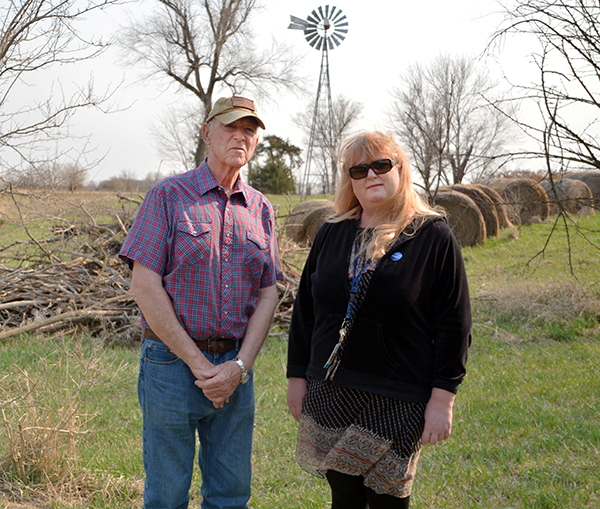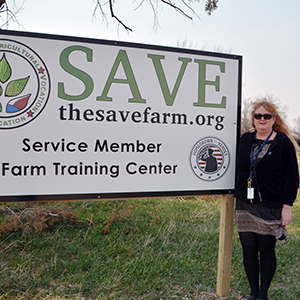Cultivating Change
Washburn Transformational Experience celebrates 10 years of success

From The Ichabod - Spring 2018
Rouge bees buzzed around a workshop in Manhattan, Kansas. Thousands of them were just delivered to the veteran-run shop, Golden Prairie Honey Farms. They didn’t bother the volunteers getting ready to place them in more than 200 hives throughout the region.
Like a soldier, a bee is loyal to its hive and commander – the queen. The ones left out of the shipping crates cling to the outside, drawn to her pheromones. Docile this time of year, they await their marching orders to produce honey.
Shari LaGrange-Aulich, ba ’13, ma ’16, a self-described Army brat, has lived in 34 places in her life with more time spent outside the United States than in. She’s a behavioral health psychologist at Konza Prairie Community Health and Dental Center in Junction City. Her father, retired Col. Gary LaGrange, looks and talks as if agriculture has been his trade his entire life. Instead, he saw multiple combat tours, is a Purple Heart recipient and retired as garrison commander at Fort Riley in 1991.
As LaGrange-Aulich was settling back into life in the United States and working toward psychology degrees at Washburn University, her father had started teaching veterans beekeeping, something he dabbled in while growing up and was now doing at a master level. Beekeeping seemed to have a positive effect on veterans as they transitioned into life away from combat.
“We look at the correlation between the bees and the hive. You have your place, your rank, your job and your purpose. These guys can relate,” LaGrange-Aulich said.
Thanks to research findings from three Washburn Transformational Experience projects she completed as a student, Lagrange-Aulich discovered post-traumatic growth. Some people experience trauma, bounce back and come out stronger on the other end. Armed with her research findings, LaGrange-Aulich convinced her dad to expand beekeeping into a full-service farm where transitioning veterans get training in a field both in demand and therapeutic. LaGrange-Aulich said, according to the United States Department of Agriculture, 1 million new farmers will be needed in the next 15 years.
“I think working with nature, focusing on something healthy and seeing it from beginning to end,” LaGrange said, “it’s purposeful, focused and down-to-earth natural goodness. It has a very positive effect.”
 As Washburn recently celebrated 10 years of providing students a chance to enhance their education through a WTE, LaGrange-Aulich and her father were developing SAVE farm – the Servicemember Agricultural Vocation Education farm. LaGrange-Aulich is a board member and clinical advisor and is developing a treatment manual for veterans at the farm. Her father is president. On more than 2,500 acres throughout northeast Kansas, they teach veterans to grow crops, raise livestock and maintain beehives with the backing of research she started at Washburn.
As Washburn recently celebrated 10 years of providing students a chance to enhance their education through a WTE, LaGrange-Aulich and her father were developing SAVE farm – the Servicemember Agricultural Vocation Education farm. LaGrange-Aulich is a board member and clinical advisor and is developing a treatment manual for veterans at the farm. Her father is president. On more than 2,500 acres throughout northeast Kansas, they teach veterans to grow crops, raise livestock and maintain beehives with the backing of research she started at Washburn.
On the 320-acre main campus northwest of Manhattan, a donated John Deer tractor – recently used to plow a field for soybeans – stands among a barn, windmill, hay bales, brush piles and beehives. SAVE farm is a licensed non-profit, and through grants and donations, the campus will have a residence for 100 people, a therapy center, a spiritual center, dining and educational facilities. LaGrange-Aulich said the USDA wants the farm to serve as a model for other such training facilities. The Veteran’s Administration is behind it, and aging farm owners are excited about passing their operations on to skilled veterans.
“We want to give veterans a purpose and more than just coming to therapy once a week,” LaGrange-Aulich said. “So we thought, why don’t you learn a career, and your therapist is also teaching you beekeeping or horticulture. We’re really working at this as holistic and treating the mind, body and soul.”
Retired Staff Sgt. Tim Heiman works with SAVE farm and owns his own farm. The work is therapeutic for someone returning from combat and facing PTSD.
“When you work with bees, it’s kind of calming. You can’t just swat at them. They produce all the honey. If you don’t take care of them, you don’t have any,” he said.
The Transformation
When LaGrange-Aulich came to Washburn, she wanted something meaningful, and the WTE program seemed like the perfect fit. With mentorship from Cindy Turk, professor and chair of psychology, she researched positive ways people grew from traumatic experiences. She found trauma survivors had greater inner strength and stronger relationships with others. Instead of distress and anti-social behavior, studies found a relationship between trauma exposure and pro-social behaviors.
Her WTE experience and the work she does now are exactly what Washburn wanted when the WTE launched in 2007-08. With faculty mentorship, WTE students study abroad, attend a conference, do research, create an art piece or other approved project and present their findings.
Mike Russell, psychology professor and director of the scholarly and creative WTE area, was involved with the creation of the WTE when faculty were asked to think of life-changing experiences they had outside the classroom.
“I like to think outside the box and just think there is no box,” said Russell. “What experiences can we give our students that will change their lives?”
The goal was to create a unique program to give students similar experiences. There are four WTE areas: community service, international education, leadership and scholarly/creative. Students did about 400 WTEs a year when it started and was required before graduation. Now, as an optional program, the number has grown to more than 600 a year.
Jack Van Dam, ba ’17, did multiple WTEs in all four areas while earning a political science degree. He studied abroad six times and is now earning a master’s in higher education and student affairs at the University of South Carolina. He’s a graduate assistant in the study abroad office and will be leading students on a trip this fall.
“My study abroad programs were truly life changing, transformational experiences that allowed me to grow, learn and build connections with people from all across the world,” Van Dam said. “I am able to share with students the fantastic benefits of studying abroad and my own personal experiences that changed my life.”
Limitless Potential
Russell has been pleased with the experiences WTE students have had, and he’s confident the program will carry momentum into the future.
“It’s 100 percent the student’s passion, and this is a way to unleash their passion,” Russell said. “Students are naturally curious, and when you work on something you’re really interested in, it doesn’t seem like work. I love how Washburn invests in our students and is giving them these great opportunities. I see no limit to it.”
LaGrange-Aulich and her dad are changing lives through their unique approach to growth after trauma. They see fields of uncultivated potential.
“It might not look like much today, but, boy, it’s going to be something someday,” LaGrange-Aulich said.
As they harvest their crops and honey this year, and another group of veterans learns an important trade while transitioning to civilian life, she’ll certainly know she, her father and the SAVE farm are transforming lives.